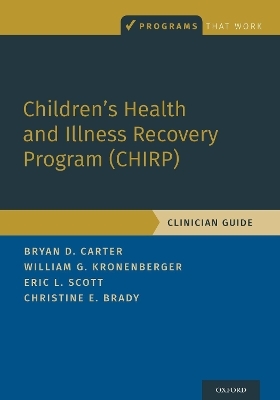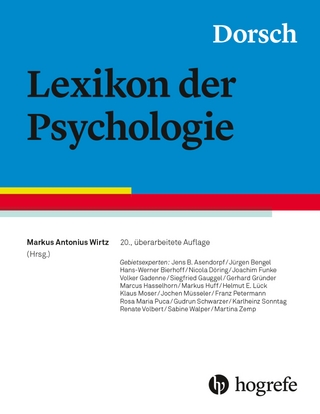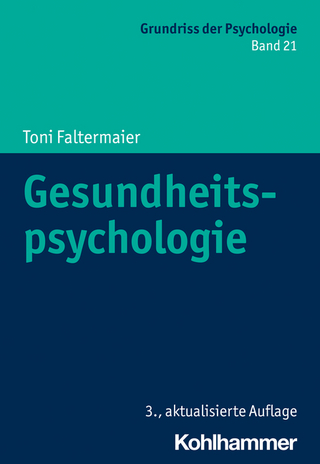
Children's Health and Illness Recovery Program (CHIRP)
Oxford University Press Inc (Verlag)
978-0-19-007026-7 (ISBN)
Youth with chronic illness, particularly when accompanied by debilitating, painful and/or fatiguing symptoms, face challenges that may prove disruptive to their normal physical, psychological and social developmental trajectories. Derived from six decades of combined experience from authors, Bryan D. Carter, William G. Kronenberger, Eric L. Scott, and Christine E. Brady, The Children's Health and Illness Recovery Program (CHIRP) is an interdisciplinary cognitive behavioral and family systems-based treatment program designed to maximize the independent functioning of teens with chronic illness.
The CHIRP Clinician Guide is a detailed outline for implementing this manualized treatment protocol over the course of twelve sessions and provides clear guidance as to the philosophy, pragmatics and art of working with this challenging pediatric population. Designed to accompany the CHIRP Teen and Family Workbook, The Clinician Guide equips practitioners with specific assessment measures and the tools needed to establish a collaborative treatment team approach that incorporates the skills of the CHIRP clinician, primary care and specialty physicians, and the various other healthcare (e.g., physical therapists, occupational therapists, etc.) and educational professionals critical to the successful management and treatment of these youth.
Dr. Bryan Carter is a Professor with the Department of Pediatrics, Division of Child & Adolescent Psychiatry and Psychology, University of Louisville School of Medicine, and the Service Chief of the Pediatric Consultation-Liaison Service to Norton Children's Hospital. He is the primary developer of the CHIRP (Children's Health & Illness Recovery Program) manualized treatment intervention for adolescents and their families coping with the challenges of chronic illness, and co-editor with Kris Kullgren, PhD, of the Clinician Handbook of Pediatric Psychological Consultation in Medical Settings. William G. Kronenberger, PhD, is Professor, Director of the Section of Psychology, and Executive Vice-Chair of the Department of Psychiatry at Indiana University School of Medicine (IUSM). He serves as Chief of the Pediatric Psychology Testing Clinic and Co-Chief of the ADHD Clinic at Riley Hospital for Children. He is an author of several tests, including the Learning, Executive, and Attention Author Biography Functioning scale (LEAF), Conduct-Hyperactivity-Attention-Oppositional Behavior Scale (CHAOS), the Pediatric Inpatient Behavior Scale (PIBS), and the Outburst Monitoring Scale (OMS). Eric L. Scott, PhD is a pediatric psychologist and Associate Professor of Pediatrics and Anesthesiology at the University of Michigan Medical School. He directs the MiPAIN (Michigan Pediatric and Adolescent Interdisciplinary Network) program, a comprehensive, interdisciplinary treatment program including physical therapy services, occupational therapy, psychotherapy, art and recreation therapy restoring health to individuals and their families with complex, chronic pain. Christine E. Brady, PhD is an Assistant Professor with the Department of Pediatrics, Division of Child & Adolescent Psychiatry and Psychology at the University of Louisville School of Medicine and the Assistant Chief of the Pediatric Consultation-Liaison Service to Norton Children's Hospital. Dr. Brady also has expertise in transgender
Acknowledgements
Introduction and Prep Session
Chapter 1: Session 1-Stress Identification and Management
Chapter 2: Session 2-Problem-Solving Skills
Chapter 3: Session 3-Relaxation Skills
Chapter 4: Session 4-Thought Challenging Skills
Chapter 5: Session 5-Time Management and Prioritization
Chapter 6: Session 6-Increasing Teen Independence
Chapter 7: Session 7-Assertiveness and Relationships
Chapter 8: SESSION 8: Family Roles, Communication, and Support
Chapter 9: SESSION 9: Keys to Maintaining Progress
Chapter 10: SESSIONS 10-12: Skill Reinforcement and Relapse Prevention
APPENDICES
Appendix A: Model 504 Letter
Appendix B: CHIRP Mastery Rating Scales
Appendix C: CHIRP Program Brochure
Appendix D: CHIRP Physician Referral Form
Appendix E: CHIRP Interdisciplinary Communication Form
Appendix F: CHIRP Feedback Form
Appendix G: Suggested Assessment Measures
Appendix H: Conducting CHIRP in a Group Format
Appendix I: CHIRP Group Intake Form
Appendix J: CHIRP Outcomes Study Results
Appendix K: CHIRP Follow-Up Study Results
Appendix L: CHIRP Commitment Form
References
| Erscheinungsdatum | 03.01.2020 |
|---|---|
| Reihe/Serie | Programs That Work |
| Verlagsort | New York |
| Sprache | englisch |
| Maße | 251 x 175 mm |
| Gewicht | 363 g |
| Themenwelt | Geisteswissenschaften ► Psychologie ► Allgemeines / Lexika |
| Geisteswissenschaften ► Psychologie ► Klinische Psychologie | |
| Medizin / Pharmazie ► Medizinische Fachgebiete ► Psychiatrie / Psychotherapie | |
| ISBN-10 | 0-19-007026-9 / 0190070269 |
| ISBN-13 | 978-0-19-007026-7 / 9780190070267 |
| Zustand | Neuware |
| Haben Sie eine Frage zum Produkt? |
aus dem Bereich


